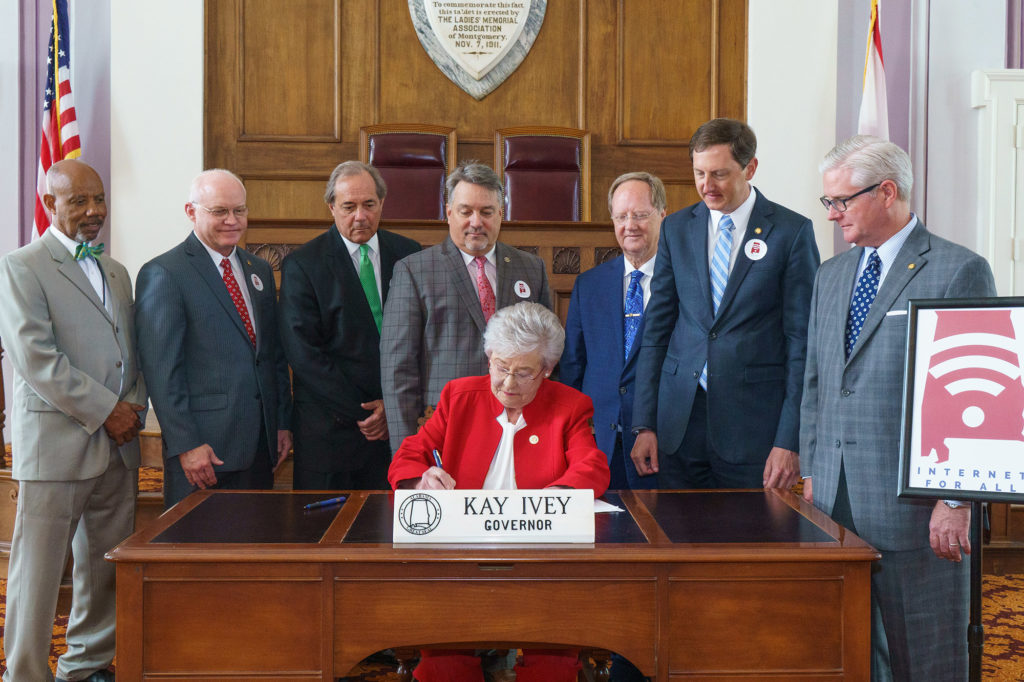
The path to broadband internet access for more than a million rural Americans just got a little clearer.
On May 30, the governors of Alabama and North Carolina signed new laws that lift major hurdles for electric cooperatives to provide high-speed connectivity to unserved and underserved communities in their states.
Both laws authorize—but do not mandate—electric co-ops to deploy retail broadband and pursue any federal funds available for the task. The laws also allow co-ops to use their existing easements and infrastructure to deploy fiber to the home and ban class action suits against doing so.
Georgia, Indiana, Missouri, Tennessee and Texas have recently passed laws that facilitate rural broadband.
“These new broadband laws with provisions tailored to each state recognize the important role electric co-ops play in upholding the economic health, education and well-being of their consumer-members,” said Brian O’Hara, NRECA regulatory issues director for telecom and broadband.
Under Alabama’s new Broadband Using Electric Easements Accessibility Act, legal challenges to electric co-ops and utilities over easement use have a three-year statute of limitations and plaintiffs only may sue for actual damages, not punitive or consequential.
The Alabama Rural Electric Association of Cooperatives and its member co-ops helped shape the law to deliver broadband to what it estimates as 1 million residents without service.
“The law sets a bright line as to what co-ops can and cannot do,” said Sean Strickler, vice president of public affairs at the Alabama statewide. “We didn’t want to spend $1 million in a court case to prove we can do what we know we can do. This law removes those questions or concerns.”
Alabama co-ops and utilities that elect to provide broadband must provide a minimum speed of 25 megabits per second for download and upload under the new law. This prevents rural communities from having to settle for lower speeds based on obsolete technology, Strickler said.
The Federal Communications Commission defines broadband as 25 Mbps/3 Mbps and estimates at least 21.3 million Americans lack that level of internet access.
“We wanted to set ourselves to a higher standard,” said Strickler.
Two Alabama co-ops, Tombigbee Electric Cooperative and North Alabama Electric, already offer broadband. The new law plus the legislature’s approval of $20 million in state grants for rural broadband has several other co-ops exploring the broadband space, he said.
North Carolina’s new Electric Co-op Rural Broadband Services law allows co-ops to form broadband partnerships and subsidiaries and lifts a 20-year state ban on using U.S. Department of Agriculture funds for telecom initiatives.
“We now have more flexibility to utilize co-op broadband infrastructure to not only deliver innovative energy solutions, but also provide access to economic development, education and health care opportunities that are critical to rural prosperity and quality of life,” said Nelle Hotchkiss, North Carolina’s Electric Cooperatives’ senior vice president and chief operating officer.
North Carolina’s Electric Cooperatives recently established a partnership with RiverStreet Networks, a subsidiary of Wilkes Telephone Membership Corp., to assist the state’s electric co-ops in the deployment of broadband by facilitating the use of the existing cooperative fiber network.
“The models developed by this partnership may help sketch a broadband solution unique to a co-op’s situation and its pockets of areas that are unserved or underserved,” said Hotchkiss.
The North Carolina government has not yet released an official estimate on the number of residents without broadband, but high-speed internet advocate Broadband Now puts the figure at 468,000.
Listen to a recent NRECA podcast episode on rural broadband:
Read more on rural broadband:
Co-op Wins $51 Million for Broadband Networks Before Groundbreaking
Takeaways From NRECA’s Broadband Case Studies (PDF)
Cathy Cash is a staff writer at NRECA.